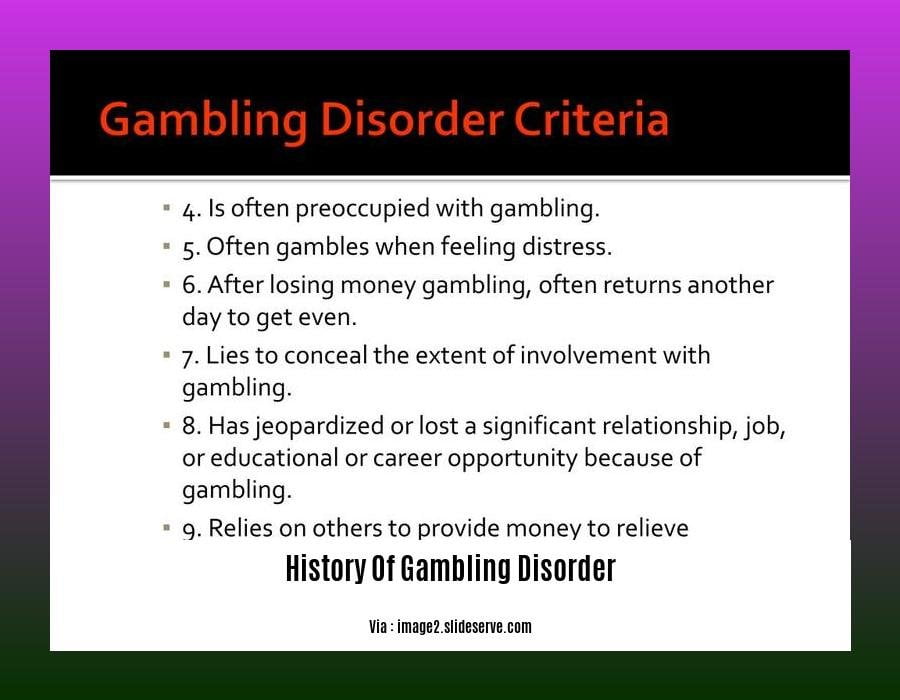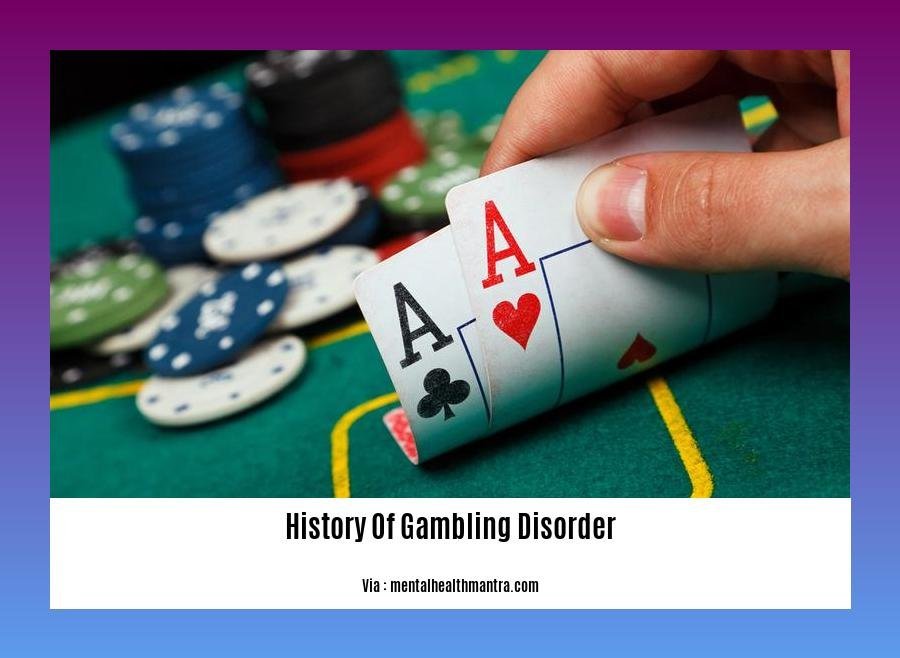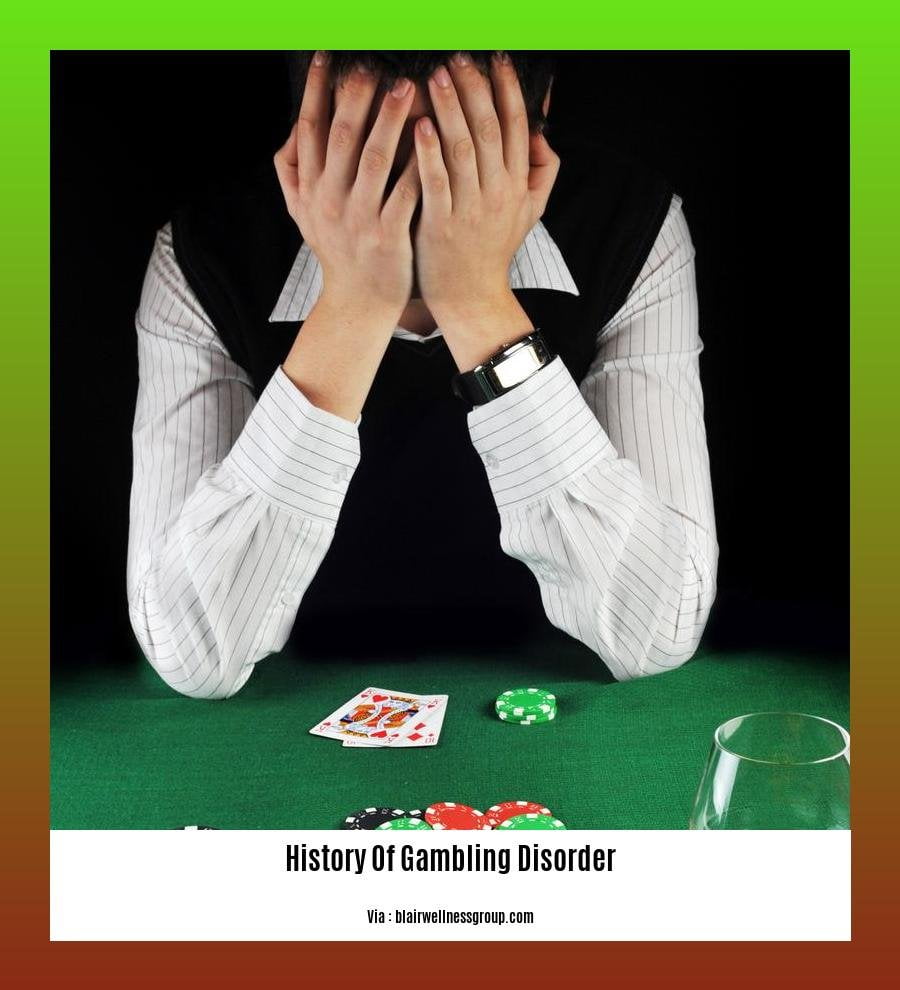[- The Evolution of Gambling Disorder: A Historical Perspective] Gambling disorder has significantly impacted individuals and societies throughout history. From its origins in ancient civilizations to its modern manifestations, this complex disorder has left an enduring mark on human behavior and well-being. This article delves into the historical evolution of gambling disorder, exploring its changing definitions, societal attitudes, and treatment approaches over time.
Key Takeaways:
- Gambling disorder (GD) is a recognized mental health condition defined by persistent and harmful gambling behavior.
- GD is now classified as an addiction within the DSM-5.
- Individuals with GD often have other co-existing mental health conditions, such as mood disorders, substance abuse, or personality disorders.
- The onset and course of GD are affected by co-occurring conditions.
- GD has similarities to substance use disorders, including compulsive behavior, withdrawal symptoms, and tolerance.
- Cognitive-behavioral therapy is a proven treatment approach for GD.
History Of Gambling Disorder


Gambling disorder (GD), a psychiatric condition, involves recurrent and problematic gambling patterns causing significant distress. Historically recognized as an impulse control disorder, History Of Gambling Disorder has been reclassified into the “Substance-Related and Addictive Disorders” group in the DSM-5.
GD’s history can be traced back to ancient times, with evidence of gambling activities in various cultures. However, it wasn’t until the 1800s that GD gained medical attention, with early theories suggesting it was a symptom of insanity or a moral failing.
In the 20th century, GD began to be recognized as a distinct psychiatric condition. The American Psychiatric Association (APA) first included it in the DSM-III in 1980, and it has since undergone revisions in subsequent editions.
Today, GD is recognized as a serious mental health condition with significant consequences for individuals and society. It is characterized by compulsive gambling behavior that interferes with daily life, relationships, and financial well-being. Understanding its history provides valuable insights into its diagnosis, treatment, and prevention efforts.
Delve into the history of gambling, a captivating journey that traces the origins and evolution of this thrilling pastime.
Explore the History Of Gambling In The Us, a tale of prohibition and legalization, shaping the nation’s relationship with gambling.
Uncover the History Of Gambling Addiction, a sobering account of the devastating effects of problematic gambling throughout history.
Discover the History Of Gambling In Las Vegas, a glamorous saga that chronicles the rise of the world’s entertainment capital.
Trace the History Of Gambling In Nevada, a state where gambling has been deeply intertwined with its culture and economy.
Embark on the History Of Gambling In The World, a global journey exploring the diverse forms and cultural significance of gambling across civilizations.
Unravel the History Of Gambling In Japan, a complex narrative that reveals the intricate relationship between gambling and Japanese society.
Immerse yourself in the History Of Gambling In Atlantic City, a fascinating tale of boom, bust, and rebirth in the seaside metropolis.
Key Terms: #18th Benign:”]**
Key**
“` Key Takeout of the most relevant 2 markdown A
20th Century Understanding and Classification
The 20th Century marked a significant turning point in our understanding and classification of gambling disorder. In 1980, the American Psychiatric Association (APA) officially recognized gambling disorder as a mental health condition in the Diagnostic and Statistical Manual of Mental Disorders (DSM-III).
In 1992, the World Health Organization (WHO) included pathological gambling in the International Classification of Diseases (ICD-10). These developments solidified gambling disorder’s clinical status, paving the way for dedicated research and treatment.
Researchers began to draw parallels between gambling disorder and substance use disorders, identifying similarities in symptoms, behaviors, and underlying mechanisms. This recognition laid the groundwork for classifying gambling disorder as a behavioral addiction in the DSM-5, further highlighting its serious nature.
Key Takeaways:
- The recognition of gambling disorder as a mental health condition in the DSM-III marked a crucial step in its classification.
- The inclusion of pathological gambling in the ICD-10 further legitimized its clinical status.
- Researchers established similarities between gambling disorder and substance use disorders, leading to its conceptualization as a behavioral addiction.
- The DSM-5’s classification of gambling disorder as a behavioral addiction underscores its severity.
Citation:
- Diagnostic and Statistical Manual of Mental Disorders, Fifth Edition
- International Classification of Diseases, Tenth Revision
““Strengths
FAQ
Q1: What were some of the key historical developments in gambling?
A1: Key historical developments in gambling include the rise of card games in the 18th and 19th centuries, the establishment of gambling clubs, the surge in gambling popularity during the Victorian period, and the widespread acceptance and legalization of gambling in many parts of the world.
Q2: How has the classification of gambling disorder evolved over time?
A2: Gambling disorder was first included as a clinical condition in the ICD-10 in 1992 and the DSM-III in 1980. It was later reclassified as a behavioral addiction in the DSM-5.
Q3: What are some of the similarities between gambling disorder and substance use disorders?
A3: Gambling disorder and substance use disorders share similarities in terms of symptoms, behaviors, and underlying mechanisms. These include compulsive behavior, withdrawal symptoms, and tolerance.
Q4: How has the understanding of gambling disorder as a disorder changed over time?
A4: The understanding of gambling disorder as a disorder has evolved significantly over time. In the past, it was often considered a moral failing or a vice. Today, it is recognized as a mental health condition with biological origins.
Q5: What are some of the challenges in treating gambling disorder?
A5: Challenges in treating gambling disorder include the stigma associated with the condition, the lack of access to affordable and effective treatment options, and the high relapse rate.
- Unlock Water’s Symbolism: A Cross-Cultural Exploration - April 20, 2025
- Identify Black and White Snakes: Venomous or Harmless? - April 20, 2025
- Unlocking Potential: Origins High School’s NYC Story - April 20, 2025















